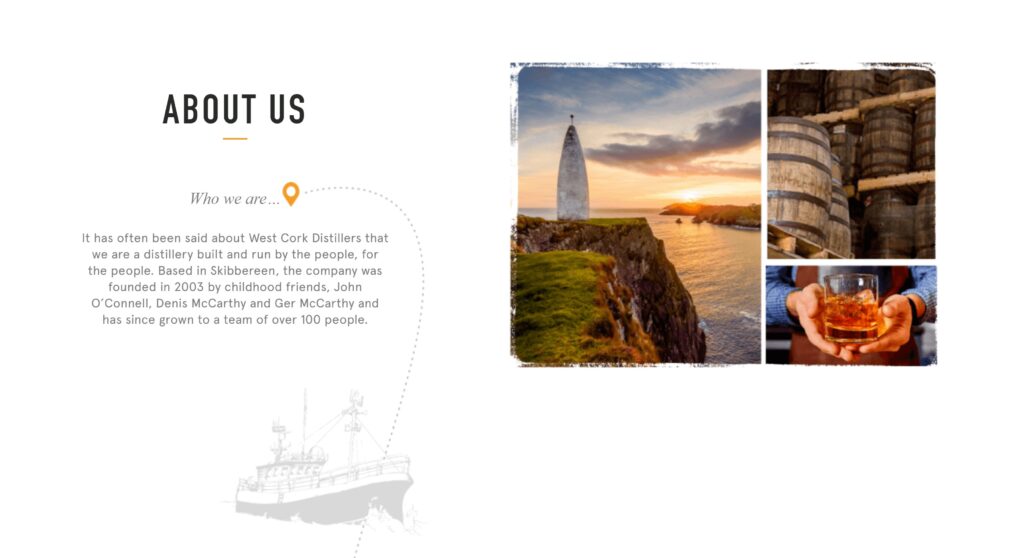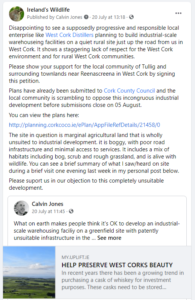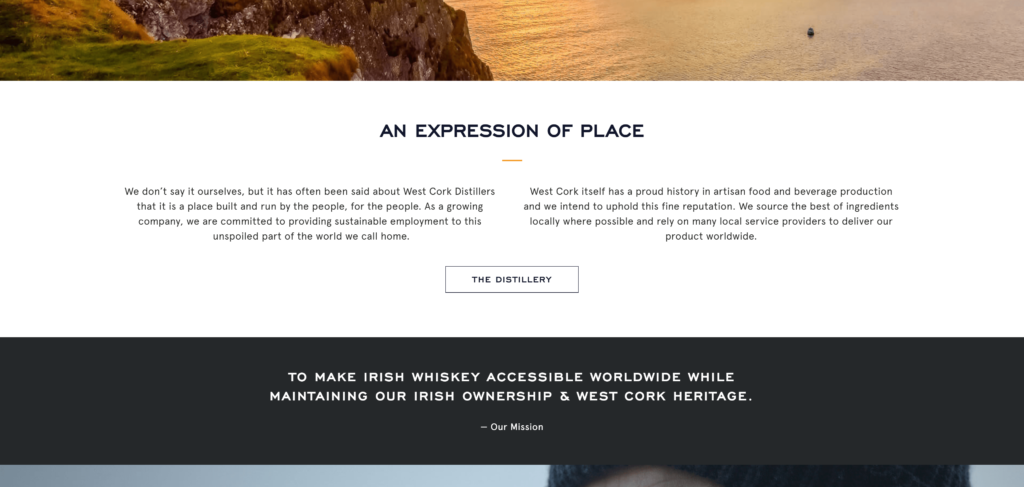Menu
In the first of a series of opinion pieces from members of the Tullig and Reenascreena community, local resident, naturalist, author and founder of Ireland's Wildlife, Calvin Jones, writes about his surprise and dismay at learning of West Cork Distillers' plans to build an industrial scale warehousing complex less than 2km from his home in rural West Cork.
When West Cork Distillers filed a planning application with Cork County Council for a massive industrial warehousing complex on a rural greenfield site in Tullig, near the village of Reenascreena in West Cork, they redefined themselves as a business. Gone were the West Cork credentials on which they'd built their brand. This was the act of a large corporate entity pursuing profit above people, place and everything else.


For a company that has always put its West Cork heritage front and centre, this application (Cork County Council, Planning Application Reference 21458) to build an industrial scale warehousing facility in the middle of a tight-knit rural community, shows a staggering lack of respect for everything that makes West Cork what it is. When I suggested as much on social media recently, John O'Connell, CEO of West Cork Distillers, called me within 24 hours to say how "very upset" he was.
Well, I'm sorry John, but you reap what you sow, and I'm not the only one who thinks this proposal by West Cork Distillers is way out of line. 121 people from this small rural community signed the Tullig & Reenascreena Community Group Submission we sent in to Cork County Council objecting to the proposal, and in less than two weeks over 800 people signed an online petition to support the community's campaign to stop the development.
I first encountered West Cork Distillers back in February 2011 when I was invited to "live tweet" a Cork Food Forum event at Inchydoney Lodge and Spa. West Cork Distillers had a small stall at the event, and I recall sampling their then new Drombeg liqueur, and being impressed at the time by both the product and the ethos of the guys behind the stall (I seem to remember them being two of the founders, but I could be wrong about that). They had passion, drive and the integrity and authenticity that is so vital to success in the Irish artisan food and drink sector.
Fast forward a decade, and in 2021 West Cork Distillers has gone from strength to strength as a business, but that integrity and authenticity I witnessed so vividly back in 2011 seems to have ebbed, supplanted by the pervasive corporate compulsion for profit, the investor's obsession with ROI.

Growth of the company, and of the Irish whiskey industry, is a good news story for Ireland and for the West Cork region. But when a business builds its image around its West Cork roots and values, it's only right to call them out when they renege on that foundation. And make no mistake, that’s what West Cork Distillers has done by submitting this incongruous plan for 16 massive industrial warehouses on an unzoned site about 5km north of Rosscarbery in West Cork's agricultural hinterland.
There are many reasons this planning application is flawed. Ultimately, though, it comes down to respect: respect for place, respect for landscape, respect for people, respect for community. West Cork Distillers built their business on those intangible qualities that make West Cork unique. It's a shame to see this "poster-child" for local enterprise dismiss those core values so readily in pursuit of profit.
West Cork Distillers has comparatively deep pockets, but the community of Tullig and Reenascreena is a committed, talented and resourceful group. We're prepared to go as far as necessary to stop this destructive and inappropriate development.
In truth, though, we shouldn't need to fight this at all.
It’s a slim hope, granted, but there is always a chance West Cork Distillers will realise this plan represents a lapse in judgement. Everybody makes mistakes, and West Cork Distillers has an opportunity now to show it remains committed to its West Cork roots, and show that the "huge respect" CEO John O'Connell insists they have for the people, landscape and communities of West Cork is alive and well. They simply need to withdraw this incongruous planning application and pursue this industrial development in a more suitable location that's in line with their brand and company values.
That's an unlikely outcome, but is perhaps the only one that leaves West Cork Distillers with its reputation intact.

How is an industrial-scale warehouse on a greenfield site in conflict with West Cork roots & values? Explain.
Hi Derry, thanks for taking the time to comment.
It's not one warehouse, it's a complex of 16 warehouses, and nothing about it sits comfortably in the rolling intimate mosaic landscape (a term used by West Cork Distillers' consultants) where they plan to build it.
West Cork is defined by its landscapes, its people and its community -- all of which West Cork Distillers has harnessed to built its business and brand image. You only need to look at their website to see that. This development shows scant regard for landscape, people or community. It fundamentally alters the nature of the area and undermines what makes rural West Cork what it is.
How does that not conflict with West Cork roots and values?
If you want to know more about why the community is objecting, you'll find a summary of our key concerns on the homepage, and a lot more detail in the comprehensive Group Submission we sent in to Cork County Council (linked to in the post above).
I hope that gives you the info you need.
Well said. I was a founder member of the Save Our Skibbereen campaign against the totally inappropriate RTC Plastics Polymer Factory at Poundlick and I see similarities between this application and the significant environmental and community problems that in our case the CCC and the EPA failed to address. Your situation has the advantage of at least knowing about the project proposal at the first stage of the planning application. It seems to me the priority of your objections must be traffic and the unsuitability of the narrow road access. The site itself and its visual impact will I think be secondary as they will argue the case on adequate screening. Our RTP fight was a very difficult and technically challenging case all of which took place post the granting of Planning permission ending in the High Court. I urge your group to investigate the EPA advice and reports on other traffic-based planning applications and to seek specialist advice in putting a detailed report together in a forceful manner at the county planning stage. I am sure you have a resourceful team put together, the most important element is that the members of the planning committee sit up to pay attention in the knowledge that they are listening to a well organised and legally credible argument. You need to win this at this level not at appeal. I wish you all success. Malcolm Thompson
Thanks for the support and advice Malcolm -- much appreciated.